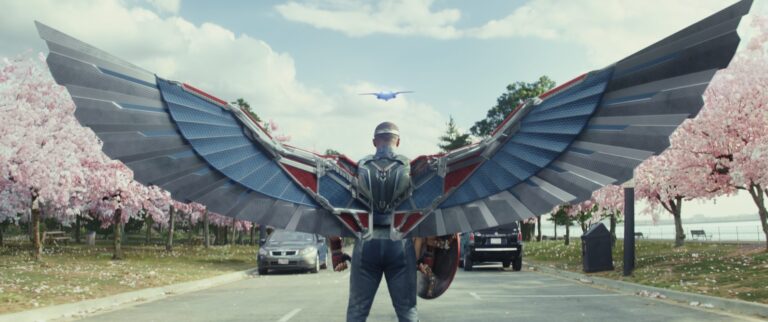With Captain America: Brave New World, Marvel Studios continues its long, winding effort to recalibrate the MCU. It’s a film that wants to stand on its own while also carrying the weight of its predecessors, bridging the past, present, and future of the franchise. The result is an ambitious but ultimately unfocused entry, one that gives Anthony Mackie his first solo flight as Captain America but frequently sidelines him in favor of franchise upkeep. While there are moments of intrigue, particularly in its performances and action set pieces, the film falls into an all-too-familiar MCU trap, often feeling more like a contractual obligation than a fully realized vision.
Taking over the mantle from Steve Rogers, Sam Wilson (Mackie) is a Captain America who lacks super-soldier abilities but compensates with a combination of tactical skill, high-tech gear, and sheer determination. Mackie delivers a solid performance, lending Wilson a grounded charisma that suits this iteration of the character. There’s a quiet confidence about Sam, but his internal struggles lurk just beneath the surface as he grapples with the weight of his predecessor’s legacy. There’s a moment in the third act where Sam opens up to another MCU mainstay (who appears in a genuinely surprising cameo), but it rings somewhat hollow because the film never fully commits to exploring what makes Sam Wilson’s Captain America distinct beyond his power limitations. Instead, it repeatedly reminds us of his lack of superhuman strength without providing a compelling emotional arc to counterbalance it.
Much of Wilson’s screentime is spent navigating political intrigue and global crises, but the narrative frequently shifts focus to other players in the MCU sandbox. Instead of a deep dive into his evolution as a hero, the film devotes significant energy to resolving dangling plot threads from past entries (The Falcon and the Winter Soldier, The Eternals, and The Incredible Hulk) and setting the table for future installments (Sam is tasked with forming a new team of Avengers). This gives us a protagonist who, despite being at the center of the film, often feels secondary to the machinations around him; it’s not only a disservice to the character, but also to an actor as talented as Mackie.
If Brave New World has a standout, it’s Harrison Ford, who steps into the role of Thaddeus “Thunderbolt” Ross following the passing of William Hurt. Clearly relishing an opportunity to play in this sort of sandbox, Ford imbues Ross with a gruff authority that toes the line between commanding and volatile. There’s an unpredictability to Ross, and Ford does a wonderful job channeling a sense of barely contained rage beneath the character’s polished exterior. The film builds tension around his presence, making it clear that his anger — one of the Ross’s defining traits in the comics — could manifest at any moment. When it finally does, it’s a transformation that’s expected (thanks to the film’s marketing campaign, which spoiled the reveal months ago) but still satisfying.
Despite its storytelling shortcomings, Brave New World does showcase some creative action beats that, at least conceptually, inject fresh energy into the film. The set pieces range from intense hand-to-hand combat to large-scale aerial battles that feel inspired by the Top Gun franchise, with imaginative use of Wilson’s shield and vibranium-enhanced wingsuit. However, while the ideas behind some of these sequences are commendable, their execution leaves often much to be desired. The cinematography often feels too tight, making it difficult to discern what’s happening, with quick cuts and overly busy camerawork diluting the impact of what could have been some of the most thrilling moments in the film. Another unfortunate hallmark of more recent MCU fare has been action marred by these sort of choices, and Brave New World is no exception; it would be interesting to see how a competent, seasoned action filmmaker could elevate some of this material, but director Julius Onah is not up to the task.
More than anything, Brave New World suffers from its place within the larger MCU framework. While interconnected storytelling has always been part of Marvel’s appeal, the balance here feels especially lopsided. The film rarely gets a chance to breathe on its own terms, instead functioning as a bridge between past and future chapters. The presence of Samuel Sterns (Tim Blake Nelson), for example, feels more about reintroducing a long-dormant character than serving this particular narrative. Likewise, the introduction of adamantium feel less like an organic story beat, and more like pieces being moved into place for future films.
Captain America: Brave New World isn’t a disaster, but it’s also far from the bold, defining chapter that Sam Wilson deserves. Mackie does his best with what he’s given, and Ford injects the film with a much-needed dose of gravitas, but the script’s insistence on serving the greater MCU prevents the story from reaching its full potential. In the end, it feels like a placeholder: a necessary but uninspired installment designed to keep the MCU machine running rather than pushing it forward in any meaningful way. It may not be the worst entry in the franchise, but it’s certainly not the revitalization that Marvel desperately needs.

